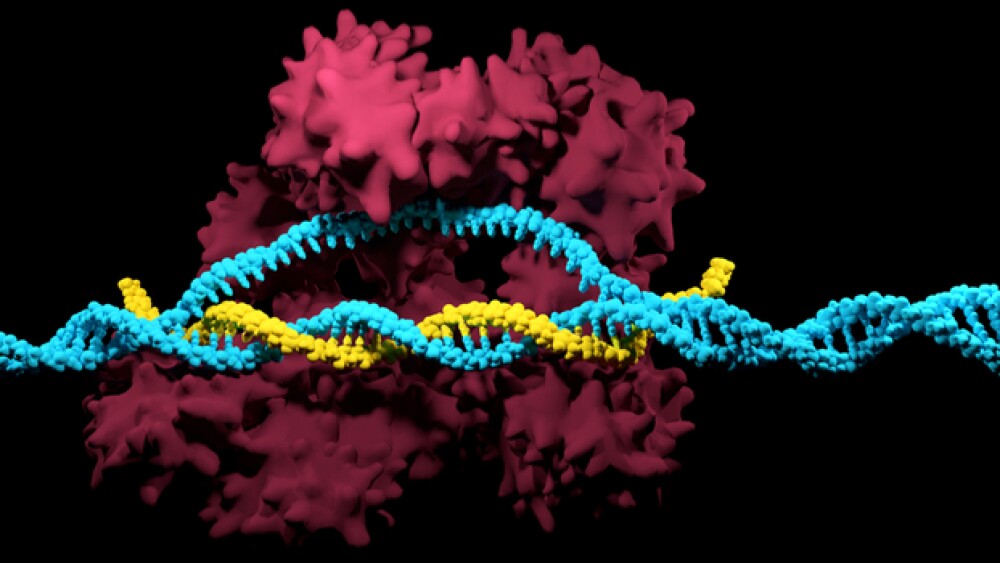It was a win for the Broad Institute of the Massachusetts Institute of Technology (MIT) and Harvard University, as a federal court of appeals ruled against the University of California (UC) on CRISPR patents.
Illustration of CRISPR-Cas9 technology
It was a win for the Broad Institute of the Massachusetts Institute of Technology (MIT) and Harvard University, as a federal court of appeals ruled against the University of California (UC) on CRISPR patents.
CRISPR stands for Clustered Regularly Interspaced Short Palindromic Repeats. With that and the Cas9 enzyme, the system allows researchers to specifically cut the genome at the desired location, which allows existing genes to be removed or new genes to be inserted.
Broadly, CRISPR-Cas9 as a technology was discovered by University of California, Berkeley (CAL) professor Jennifer Doudna and Emmanuelle Charpentier of the Helmholtz Centre for Infection Research in Braunschweig, Germany.
Feng Zhang, a researcher at the MIT-Harvard Broad Institute, filed a broad U.S. patent claim on the technology. The patent battles revolve around changes in U.S. patent law in the last few years. For a long time, it was “first to invent,” meaning that whoever was the first person to invent or discover a technology was the patent owner. They had to prove it, which creates its own hurdles. Then, in late 2011, the U.S. switched to “first-to-file,” and it went into effect on March 16, 2013. Various aspects of the patent litigation also include which particular settings the patents apply to—in mammalian eukaryotic cells as opposed to bacterial cells, in test tubes or in live animals, for example, and whether Zhang’s developments were obvious or not based on Doudna and Charpentier’s work.
In this most recent case, the Court of Appeals held that there was “no interference in fact” between the CRISPR patents the Broad Institute was awarded and CRISPR patents that the University of California had applied for. In 2017, three judges on the Patent Trial and Appeal Board (PTAB) made the ruling unanimously.
STAT writes, “The decision turned on two key and related points: whether the work that Broad scientist Feng Zhang did to make CRISPR edit the genome of mammalian cells was ‘obvious’ in light of what Jennifer Doudna, of the University of California, Berkeley, and her colleagues accomplished in editing free-floating DNA in test tubes, and whether Zhang and other scientists trying to do that had a ‘reasonable expectation of success.’”
Despite conflicting evidence, Judge Kimberly Moore wrote in her opinion on the case that “substantial evidence supports [PTAB’s] finding that there was not a reasonable expectation of success, and we affirm…. [PTAB] did not err in its analysis.”
Jaboc Sherkow, patent expert with the New York Law School, told STAT that the decision “is absolutely 100 percent correct on the law,” which is unlikely to give UC any shot at an appeal or a re-hearing.
The Broad Institute issued a statement, saying the ruling was “clearly supported by sufficient evidence and followed applicable legal standards…. It is time for all institutions to move beyond litigation. We should work together to ensure wide, open access to this transformative technology.”
UC, not surprisingly, isn’t conceding defeat yet, noting that a patent filed in 2012 by Doudna and Charpentier was still pending. STAT writes, “That application has had a long and convoluted history, having been revised numerous times, with scores of claims added and cancelled. It covers CRISPR-Cas9 genome editing in any kind of cell, even though the Doudna-Charpentier experiments were done in DNA floating in a test tube.”
The court decision doesn’t solve all intellectual property arguments related to CRISPR, but it settles some. The Broad gets to keep its patents, of which the first was awarded in 2014, related to the CRISPR-Cas9 technology for eukaryotic cells Zhang invented. It also allows the Broad’s numerous license holders, especially Editas Medicine, to relax a little bit.
STAT writes, “Since CRISPR Therapeutics licensed Charpentier’s invention (which is covered by the UC patent) and Intellia Therapeutics licensed Doudna’s, they now face a tougher but not impossible intellectual-property landscape.”
There are also pending lawsuits in Europe.
In a joint release, CRISPR Therapeutics, Intellia Therapeutics, and Caribou Biosciences stated, “Consistent with the consensus of the scientific community, the companies believe firmly in the strength, breadth and scope of the foundational IP covering the technology developed by Drs. Emmanuelle Charpentier and Jennifer Doudna and their research teams. The companies expect that the USPTO will continue to issue patents to UC covering the foundational CRISPR/Cas9 technology, including its use in any environment. The USPTO recently issued U.S. Patent No. 10,000,772 for the use of CRISPR/Cas9 genome editing covering widely used guide formats in various environments, including eukaryotic cells. The companies expect this is the first of many patents that will issue based on the foundational work done by Drs. Charpentier and Doudna and their teams.”
The companies went on to point out that the University of California has foundational patents issued in Europe, which includes about 40 countries, as well as the UK, China, Singapore, Australia, New Zealand and Japan. These patents broadly cover single-guide RNA for CRISPR/Cas9 in all settings, including eukaryotic cells.





